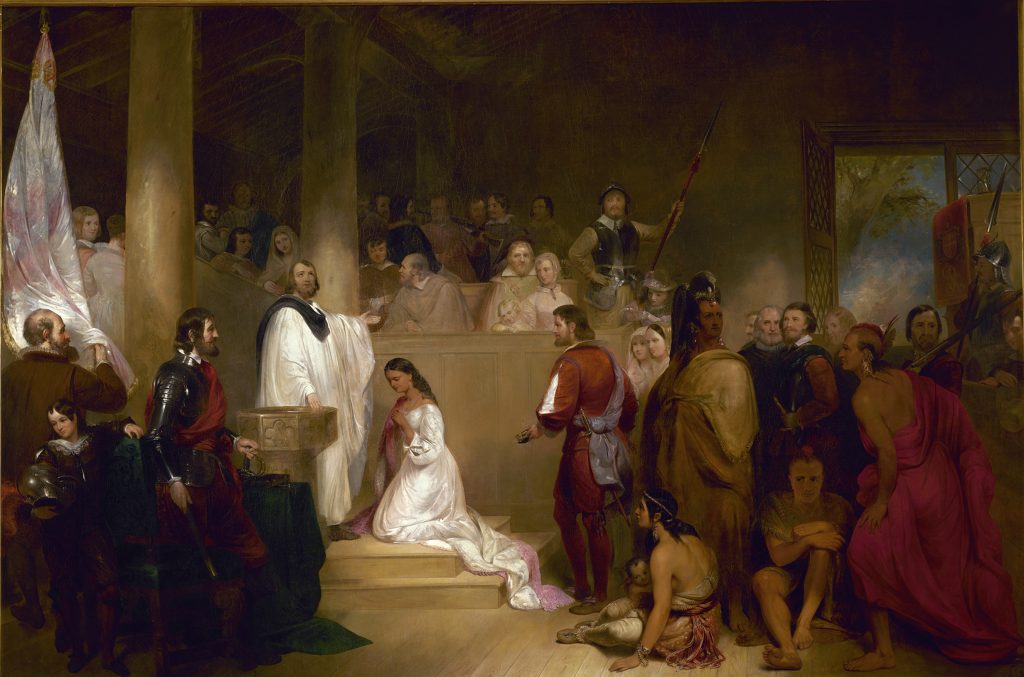Coronation of Powhatan

In the ensuing September, Smith was formally made president of the colony at Jamestown, and set himself promptly to correct abuses and perfect the company in the military exercises so suited to his own inclinations, and so essential in their isolated and dangerous position.
The wandering savages would collect in astonishment to see these performances, standing “in amazement to behold how a file would batter a tree, where he would make them a mark to shoot at.”
Newport, soon after, made his appearance, bringing out from England many adventurers ill-suited to the life before them in the new country: “thirty carpenters, husband men, gardeners, fishermen, blacksmiths, masons, and diggers up of trees roots,” says Smith, would have been worth a thousand of them. By the same arrival, came a large boat, brought out in five pieces, to be used in further explorations in search of the South Sea, and a crown, with brilliant trappings and regalia, for the solemn coronation of Powhatan. Smith speaks with great contempt of this transaction: the “costly novelties had been much better well spared than so ill-spent,” for they, had the king’s “favor much better only for a plain piece of copper, till this stately kind of soliciting made him so much overvalue himself that he respected us as much as nothing at all.”
Smith’s Visit To Werowocomoco For Supplies
The captain, with four companions, volunteered to go to “Werowocomoco, and invite Powhatan to come to Jamestown and receive his presents. Arriving at the village, they found that the chief was thirty miles away from home; but a messenger was dispatched for him, and, meanwhile, his daughter Pocahontas exerted herself, to the best of her ability, to divert and entertain her guests. This was done after a strange fashion. A masquerade dance of some thirty young women, nearly naked, was ushered in by such a ” hideous nowise and shrieking,” that the English seized on some old men who stood by, as hostages, thinking that treachery was intended. They were relieved from apprehension by the assurances of Pocahontas, and the pageant proceeded. The leader of the dance was decked with a “fair pair of buck’s horns on her head, and an otter’s skin at her girdle.” The others were also horned, and painted and equipped, “every one with their several devices. These fiends with most hellish shouts and cries, rushing from among the trees, cast themselves in a ring about the fire, singing and dancing with most excellent ill variety.” Afterwards, when Smith had entered one of their wigwams, “all these nymphs more tormented him than ever with crowding, pressing and hanging about him, most tediously crying, Love you not me? love you not me?”
Treachery Of Powhatan
Upon Powhatan’s return, he proudly refused to go to Jamestown for his presents, standing upon his dignity as a king; and the robes and trinkets were accordingly sent round to Werowocomoco by water. The coronation scene must have been ludicrous in the extreme: “the presents were brought him, his basin and ewer, bed and furniture set up, his scarlet cloak and apparel with much ado put on him, being persuaded by Namontack, they would not hurt him: but a foul trouble there was to make him kneel to receive his crown, he neither knowing the majesty nor meaning of a crown, nor bending of the knee, endured so many persuasions, examples and instructions as tired them all; at last, by leaning hard on his shoulders, he a little stooped, and three having the crown in their hands, put it on his head, when, by the warning of a pistol the boats were prepared with such a volley of shot, that the king start up with a horrible fear till he saw all was well.”
After this, Newport, with one hundred and twenty men, made some unimportant explorations, above the falls, among the Monacans. Their continual greedy search for mines of the precious metals interfered with useful operations and discoveries.
The Indians now became unwilling to trade, and Powhatan seemed to have adopted the policy of starving out the colony. We can hardly justify the course of Smith in enforcing supplies, on any other plea than that of necessity; but certain it is, that he alone seemed to have that power and influence over the simple savages which could secure at once their love and fear.
Powhatan having at last agreed to furnish a ship-load of corn, if the English would build him a house, and furnish him with a grindstone, a cock and hen, some arms, copper and beads, five men were sent to Werowocomoco to commence operations. Three of these were Dutchmen.
To carry out this contract, and procure the promised corn, Smith started for the camp of Powhatan towards the last of December, (1608,) accompanied by twenty-seven men in the barge and pinnace, while a number of others crossed the country to build the proposed house. At Warraskoyack, the friendly king cautioned him against being deceived by Powhatan s expressions of kindness, insisting that treachery was intended.
Christmas was spent by the party at Kecoughtan, on the left bank of James River, near its mouth; and merry cheer was made upon game and oysters. They reached “Werowocomoco on the 12th of January, and landed with much difficulty, as the river was bordered with ice, to break through which they were obliged to wade waist-deep, “a flight-shot through this muddy frozen oase.”
Powhatan gave them venison and turkeys for their immediate use, but when the subject of the corn was broached, he protested that he and- his peo

